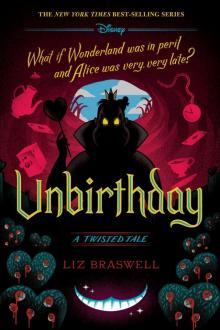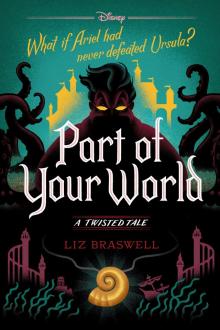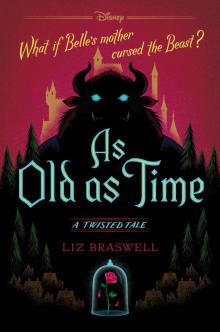- Home
- Liz Braswell
Part of Your World
Part of Your World Read online
A special thank-you to organizations who help
save creatures under and around the sea, like the
Mass Audubon’s Wellfleet Bay Wildlife Sanctuary.
Copyright © 2018 Disney Enterprises, Inc.
Cover design by Scott Piehl and Catalina Castro
Cover illustration by Jim Tierney
All rights reserved. Published by Disney Press, an imprint of Disney Book Group. No part of this book may be reproduced or transmitted in any form or by any means, electronic or mechanical, including photocopying, recording, or by any information storage and retrieval system, without written permission from the publisher. For information address Disney Press, 1200 Grand Central Avenue, Glendale, California 91201.
ISBN 978-1-368-02674-1
Visit disneybooks.com
Contents
Title Page
Copyright
Dedication
Prologue
Eric
Scuttle
La Sirenetta, a Musical Fantasy in Three Acts
Scuttle
Atlantica
Ariel
Ariel
Ariel
Sebastian
Ariel
Ariel
Ariel
Ariel
Ariel
Eric
Ursula
Ariel
Eric
Ursula
Ariel
Eric
Ursula
Ariel
Sebastian (and Flounder)
Ariel
Ariel
Eric
Ariel
Carlotta and Grimsby
Eric
Ursula
Eric
Ariel
Ariel
Ursula
Ariel
Eric
Ariel
Ursula and Eric
The Good Folk of Tirulia/Rumors
Eric
Ariel
Ursula
Ariel and Eric
Ariel and Eric
Eric
Flotsam and Jetsam
Ariel
Ariel and Eric
Ursula
Ariel
Eric
Ariel
Ursula
Ariel
Eric
Ariel
Ariel
Eric
Jona
Eric
Ariel
Ariel and Eric
Vareet
About the Author
To Elizabeth (the) Schaefer, who started off the series as
one of my editors, and continues on as a good friend.
This book is for everyone who helps protect
Ariel’s ocean—which includes you, whenever you
eat sustainable seafood and skip the straw!
—L.B.
In the foothills of the Ibrian Mountains…
Cahe Vehswo was in the field repairing a wooden fence. It was less to keep the wolves out than to keep the stupid sheep in, where the only slightly smarter child-shepherds could watch them.
It was a beautiful day, almost sparkling. The pines weren’t yet brittle from late summer heat and the deciduous trees were in full glory, their dark green leaves crackling in the wind. The mountains were dressed in midseason blooms and tinkly little waterfalls. The clouds in the sky were ridiculously puffy.
The only off note in nature’s symphony was a strange stink when the wind came up from the southern lowlands: burning animal fat, or garbage, or rot.
Everyone in the hamlet was out doing chores in such forgiving weather; rebuilding grapevine trellises, chopping wood, cleaning out the cheese barrels. No one was quarreling—yet—and life on their remote hillside seemed good.
Then Cahe saw something unlikely coming up the old road, the King’s Road. It was a phalanx of soldiers, marching in a surprisingly solid and orderly fashion considering how far they were from whatever capital they had come. With their plumes, their buttons that shone like tiny golden suns, and their surprisingly clean jackets, there was almost a parade-like air around them. If not for their grim, haughty looks and the strange flag they flew.
An order was cried; the men stopped. The captain, resplendent in a bright blue cap and jacket, rode up to Cahe along with his one other mounted soldier, who carried their flag.
“Peasant,” he called out—somewhat rudely, Cahe thought. “Is this the township of Serria?”
“No,” the farmer started to say, then remembered long-forgotten rules for dealing with people who had shiny buttons, big hats—and guns. “Begging your pardon, sir, but that’s farther along, on the other side of Devil’s Pass. People call this Adam’s Rock.”
“No matter,” the captain said. “We claim this village and its surrounding lands in the name of Tirulia!”
He cried out the last bit, but the words bounced and drifted and faded into nothing against the giant mountains beyond, the dusty fields below, the occasional olive tree, the uninterested cow. Villagers stopped their work and drifted over to see what was going on.
“Begging your pardon again, sir,” Cahe said politely. “But we’re considered part of—and pay our taxes to—Alamber.”
“Whatever your situation was before, you are now citizens of Tirulia, and pay homage to Prince Eric and Princess Vanessa.”
“Well, I don’t know how the king of Alamber will take it.”
“That is no concern of yours,” the captain said frostily. “Soon the king of Alamber will just be a memory, and all Alamber a mere province in the great Tirulian empire.”
“You say Tirulia,” Cahe mused, leaning on the fence to make his statement sound casual. “We know it. We buy their salted cod and trade our cheese with them. Their girls like to wear aprons with braided ties. Perde, son of Javer, sought his fortune down south on a fishing ship and wound up marrying a local girl there.”
“Fascinating,” the captain said, removing one hand from his tight grip on the reins to fix his mustache. “And what is the point of all this?”
Cahe pointed at the banner that flapped in the breeze.
“That is not the flag of Tirulia.”
In place of the sun and sea and ship on a field of blue that was familiar even to these isolated people, there was a stark white background on which a black-tentacled octopus with no eyes gibbered menacingly. It looked almost alive, ready to grab whatever came too close.
“Princess Vanessa thought it was time to…update the sigil of house Tirulia,” the captain said, a little defensively. “We still represent Tirulia and the interests of Prince Eric, acting for his father, the king, and his mother, the queen.”
“I see.” Another villager started to speak up, but Cahe put a hand on his arm to stop him. “Well, what can we do, then? You have guns. We have them, too—to hunt with—but they are put away until the boars come down from the oak forests again. So…as long as the right tax man comes around and we don’t wind up paying twice, sure. We’re part of Tirulia now, as you say.”
The captain blinked. He narrowed his eyes at Cahe, expecting a trick. The farmer regarded him mildly back.
“You have chosen a wise course, peasant,” the captain finally said. “All hail Tirulia.”
The folk of Adam’s Rock murmured a ragtag and unenthusiastic response: all hail Tirulia.
“We shall be back through this way again after we subdue Serria. Prepare your finest quarters for us after our triumph over them and all of Alamber!”
And with that the captain shouted something unintelligible and militaristic and trotted off, the flag bearer quickly catching up.
As soon as they were out of earshot, Cahe shook his head wearily.
“Call a meeting,” he sig
hed. “Pass the word around…we need to gather the girls and send them off into the hills for mushroom gathering or whatever—for several weeks. All the military-aged boys should go into the wilds with the sheep. Or to hunt. Also, everyone should probably bury whatever gold or valuables they have someplace they won’t be found.”
“But why did you just give in to him?” the man next to Cahe demanded. “We could have sent word to Alamber. If we’d just told the soldiers no, we wouldn’t have to do any of this, acting like cowards and sending our children away into safety….”
“I did it because I could smell the wind. Can’t you?” Cahe answered, nodding toward the south.
Just beyond the next ridge, where the Veralean Mountains began to smooth out toward the lowlands, a column of smoke rose. It was wider and more turbulent than what would come from a bonfire, black and ashy and ugly as sin.
“Garhaggio?” someone asked incredulously. It did indeed look like the smoke was coming from there. From the volume and blackness there could have only been scorched earth and embers where that village had been just the day before.
“I bet they told the captain no,” Cahe said.
“Such causeless destruction!” a woman lamented. “What terrible people this Prince Eric and Princess Vanessa must be!”
Eric woke up.
He was having that dream again.
It came to him at the strangest times—when reviewing the menu for a formal dinner with Chef Louis, for instance, or listening to the castle treasurers discuss the ups and downs of dealing with international bankers. Or when his beautiful princess went on and on about her little intrigues.
All right: it was when he was bored and tired. If a room was stuffy and he was sleepy and could barely keep his eyes open.
Or right before he fell asleep properly, in bed—that moment between still being awake and deep in dreams. The same split-second when he often heard angelic choirs singing unimaginably beautiful hymns. He could only listen, too frozen in half-sleep to jump up and quickly scribble it down before he forgot.
But sometimes, instead of the choirs, he had this:
That he was not Prince Eric wed to Vanessa, the beautiful princess. That there had been some terrible mistake. That there was another girl, a beautiful girl with no voice, who could sing.
No—
There was a beautiful girl who could sing, who somehow lost her voice forever on the terrible day when Eric fell asleep. He had been dreaming ever since.
There were mermaids in this other world.
He had known one. Her father was a god. Eric’s princess was an evil witch. And Eric had touched greatness but been tricked, and now here he was, dreaming….
He looked down suddenly, in a panic. His arms were crossed on his desk over pages of musical notation, supporting his dozing head. Had he spilled any ink? Had he blurred any notes? A rest could be turned into a tie if the ink smeared that way…and that would ruin everything….
He held the papers up to the moonlight. There was a little smudging, there, right where the chorus was supposed to come in with a D major triad. But it wasn’t so bad.
His eyes drifted from the pages to the moon, which shone clearly through his unglazed window. A bright star kept it company. A faint breeze blew, causing the thick leaves of the trees below to make shoe-like clacking noises against the castle wall. It carried with it whatever scents it had picked up on its way from the sea: sandalwood, sand, oranges, dust. Dry things, stuff of the land.
Eric looked back at his music, tried to recapture the sound and feel of the ocean that had played in his head before waking, aquamarine and sweet.
Then he dipped his pen in ink and began to scribble madly, refusing to rest until the sun came up.
It seemed as if all of Tirulia were crowded into the amphitheatre. Every seat was filled, from the velvet-cushioned couches of the nobles up front to the high, unshaded stone benches in the far back. More people spilled out into the streets beyond. No one was going to miss the first performance of a new opera by their beloved Mad Prince Eric.
It was like a festival day; everyone wore whatever colorful thing and sparkly gem they had. Castle guards stood in polished boots along the aisles, making sure no fights broke out among the spectators. Vendors walked among the crowds both inside and out selling the bubbly, cold white wine Tirulia was known for along with savory little treats: bread topped with triangles of cheese and olive oil, paper cones filled with crispy fried baby squid, sticks threaded with honey-preserved chestnuts that glittered in the sunlight.
It would all have made a fabulous mosaic of movement and colors and dazzle from above.
And it did for a certain old seagull named Scuttle, who was quite enjoying the view.
He and a few of his great-grandgulls (sent along to watch him) perched on the rail above the highest, cheapest seats in the theatre. While the younger ones kept their sharp eyes alert for dropped morsels, ready to dive down at the tiniest crumb of bread, Scuttle contented himself with just watching the pomp and muttering to himself. Only one great-grandgull remained by his side, trying to understand what he saw in the human spectacle below.
The costumes were lavish, the orchestra full, the sets cunningly painted to look more than real: when a prince produced a play, wealth showed.
And when that prince came out to take his seat in the royal box, arm in arm with his beautiful princess, the crowd went mad, howling and cheering for their royal artist. Sometimes called the Dreamer Prince and even the Melancholic Prince for his faraway looks and tendency toward wistfulness, Eric looked momentarily cheered by this expression of love from his kingdom, and waved back with the beginnings of a real smile.
Vanessa gave one of her grins, inscrutable and slightly disturbing, and pulled him along to sit down. With her other hand she stroked the large nautilus necklace she always wore—a strangely plain and natural-looking ornament for the extravagant princess.
The orchestra tuned, and began.
In a magical kingdom by the sea, a sad and handsome prince [tenor] longs for someone to share his music and his life. While he and his friends celebrate his twenty-first birthday on a decorated yacht, a terrible storm arises. The prince is thrown over the railing of his ship and is almost drowned but for the intercession of a young and beautiful mermaid, who has the voice of an angel [first soprano].
Upon recovering, the prince declares he will marry no one but the beautiful girl who rescued him.
Then a different beautiful girl appears [same first soprano, different costume], who, although she has the shining red hair of the mermaid who saved him, is mute! So she cannot be his one true love. And yet, as they spend their days together, he slowly falls for her.
But then a rival comes onto the scene. A handsome woman [contralto] serenades the prince with the same song the little mermaid once sang and casts a spell over him, causing him to forget the pretty girl with no voice.
[Note: The contralto is a large, full-busted singer, a favorite of the audience. She gets a standing ovation when she appears, smiling slyly.]
Hypnotized, the prince arranges for the two of them to be wed immediately.
In an aside, the princess-to-be admits to the audience that she is actually a powerful sea witch. She desires revenge on the mermaid, whose father, the King of the Sea, cast the witch out of his kingdom years before. By failing to marry the prince herself, the mermaid will have neglected to uphold her end of a bargain, and the sea witch will keep her voice forever.
The sun [baritone] then sings about the tragedy of mortal life, which he has to witness every day among the humans below him on earth. He also sings about the peaceful happiness of the immortal mermaids, and how love makes one foolish—but exalted. He drifts across the stage, and, with a clever bit of scenic machinery, begins to “set” as the ballet troupe comes out for an interlude before the finale: the wedding scene.
The prince and the false princess come out dressed splendidly and singing a duet—but the prince’s words are ab
out love, and the princess’s are about conquest. The mute girl looks sadly on.
Then, just as the prince and princess are about to recite their final vows, Triton, King of the Sea [bass], resplendent in green and gold armor, appears with a crash of drums. He and the sea witch sing back and forth, trading insults. Finally he raises his trident to attack…and the sea witch points to his youngest, favorite daughter, the now-mute human standing sadly in the corner. With her other hand, she shakes a large painted prop contract.
Defeated, Triton gives in. He trades his life for the little mermaid. The sea witch casts a terrible spell, and with a puff of theatrical smoke the King of the Sea is turned into an ugly little sea polyp, which the sea witch holds triumphantly aloft.
[As a puppet manipulated by the contralto, it even moves a little, which draws a gasp from the audience.]
Triton’s daughter turns back into a mermaid and jumps sadly into the sea. The prince and the false princess are married. The false princess croons triumphantly to the little polyp that was once Triton, and talks about how she will keep him forever in a vase in her room.
The moon [mezzo-soprano] comes out and sings an ethereal, haunting version of the sun’s aria. But hers is about the inevitability and sadness of love, and questions what makes a happy ending. For if the little mermaid had stayed at home and remained a mermaid for all her days, ignorant of love, would that really have been better?
The crowd went mad. If the subject matter of the opera seemed a little fantastic, if the end a little gloomy, if the orchestration maybe just a tad simplistic compared to works by more professional, starving musicians—well, it mattered not. Never before had the amphitheatre been witness to such a display of clapping, screaming, stomping of feet, and whistling. So many roses were thrown at La Sirenetta and the sea witch that they were in danger of suffering puncture wounds from the thorns.
Everyone was already clamoring for an encore performance.
“Perhaps we should,” Prince Eric said. “A free performance—for all of the town! At the end of summer, on St. Madalberta’s Day!”
The cheers grew even louder.
Nobles seated closest to the royal box made a show of appropriately classy, restrained enthusiasm—while keeping their eyes on the prince and princess. Only a fool would have failed to notice certain similarities between the sea witch and Prince Eric’s beautiful wife, Vanessa. That night in the great stone mansions, over tiny cups of chocolate and crystal glasses of brandy, there would be much discussion of the thousand possible shades of meaning behind the words in the lyrics.

 Unbirthday
Unbirthday Straight On Till Morning
Straight On Till Morning A Whole New World
A Whole New World Once Upon a Dream
Once Upon a Dream Part of Your World
Part of Your World Nine Lives of Chloe King
Nine Lives of Chloe King The Fallen
The Fallen As Old As Time: A Twisted Tale (Twisted Tale, A)
As Old As Time: A Twisted Tale (Twisted Tale, A)